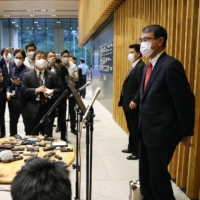Taro Kono, Japan’s vaccine czar, is fast-emerging as the public’s top choice to replace outgoing Prime Minister Yoshihide Suga, according to two polls — an edge that could have an outsized impact on the ruling party’s leadership vote ahead of a looming general election.
Kono, who also serves concurrently as administrative reform minister, was the top pick in two public opinion polls, with 23% of respondents in a survey released Monday by the Yomiuri Shimbun naming him as the most suitable person to take over from Suga.
The Yomiuri poll came just a day after Kono bested other potential candidates in a Kyodo News survey as the top pick to be Japan’s next leader, garnering the support of 31.9% of respondents.
Although Kono has not formally thrown his hat into the ring, media reports have said that Suga, who on Friday made the stunning announcement that he would step down after a Liberal Democratic Party leadership poll on Sept. 29, would back him in a bid to become president of the ruling LDP.
In a brief meeting with reporters on Monday focusing on progress in the nation’s vaccine rollout, Kono again hinted at entering the race when asked whether his duties as vaccine czar would be impeded if he decided to run.
“I’ll make sure that my duties will not be affected,” he said in response.
Kono was quick to explore entering the race, meeting Friday with Finance Minister Taro Aso, who heads the LDP faction to which he belongs, to express his intention to run. Aso reportedly gave Kono his blessing to enter the race but did not actively endorse him. They met again Monday for talks about the election, media reports said.
Kono also looks set to get a boost from former Defense Minister Shigeru Ishiba, who is reportedly considering offering his endorsement instead of running himself.
With a majority in the Lower House, the winner of the LDP presidential election is virtually assured of becoming prime minister.
As opinion polls have shown support for Suga’s Cabinet plummeting to record lows, the LDP will be looking to bolster its image ahead of the general election, which is likely to be held anytime from Oct. 17 to late November.
Kono, a popular political blue blood and maverick, could provide a boost to the party, which has taken a hit over its pandemic response, as it seeks to avert a loss of seats in the general election.
But Kono is still expected to face a stiff challenge in an LDP race that has undergone a dramatic transformation in the days since Suga’s announcement.
According to the Yomiuri poll, he held a narrow advantage over Ishiba, who was at 21%. Fumio Kishida, a former foreign minister who has already formally announced his candidacy, finished third with 12%. Sanae Takaichi, another lawmaker who has signaled an interest in running and has reportedly secured the backing of Suga’s predecessor, former Prime Minister Shinzo Abe, was far behind, with just 3%.
Sunday’s Kyodo News poll, meanwhile, saw Kono supported by 31.9% of respondents, placing him ahead of Ishiba at 26.6%, Kishida at 18.8%, LDP executive Seiko Noda at 4.4% and Takaichi at 4%.
The outcome of this year’s LDP poll could be difficult to divine because, unlike last year when Suga rolled to victory, rank-and-file members at the prefectural level will be able to vote.
Kono has in the past hinted at his prime ministerial ambitions.
“Each and every politician has something they want to accomplish. And in order to implement your program, the best way is to become the prime minister. Have no doubt about it,” he told public broadcaster NHK in January last year.
Both of his current posts have ensured that he has remained in the public spotlight. As administrative reform minister, he has won plaudits for vowing to tackle outdated practices that have stymied Japanese competitiveness, but he has drawn flak as vaccine czar for the country’s slow start to its inoculation program.
In addition to his current portfolios, the 58-year-old has racked up an enviable amount of experience despite his relatively young age and membership in a party known for its stodgy and aging politicians, serving as the country’s top diplomat from 2017 to 2019 and then as defense chief from 2019 until last year.
Kono attended a private boarding school in Connecticut, where he learned English, before entering Georgetown University and eventually attaining a level of fluency rarely seen in a Japanese leader. He’s also the country’s most-followed politician on Twitter, on which he has Japanese- and English-language accounts.
In a time of both misinformation and too much information, quality journalism is more crucial than ever.
By subscribing, you can help us get the story right.
SUBSCRIBE NOW



